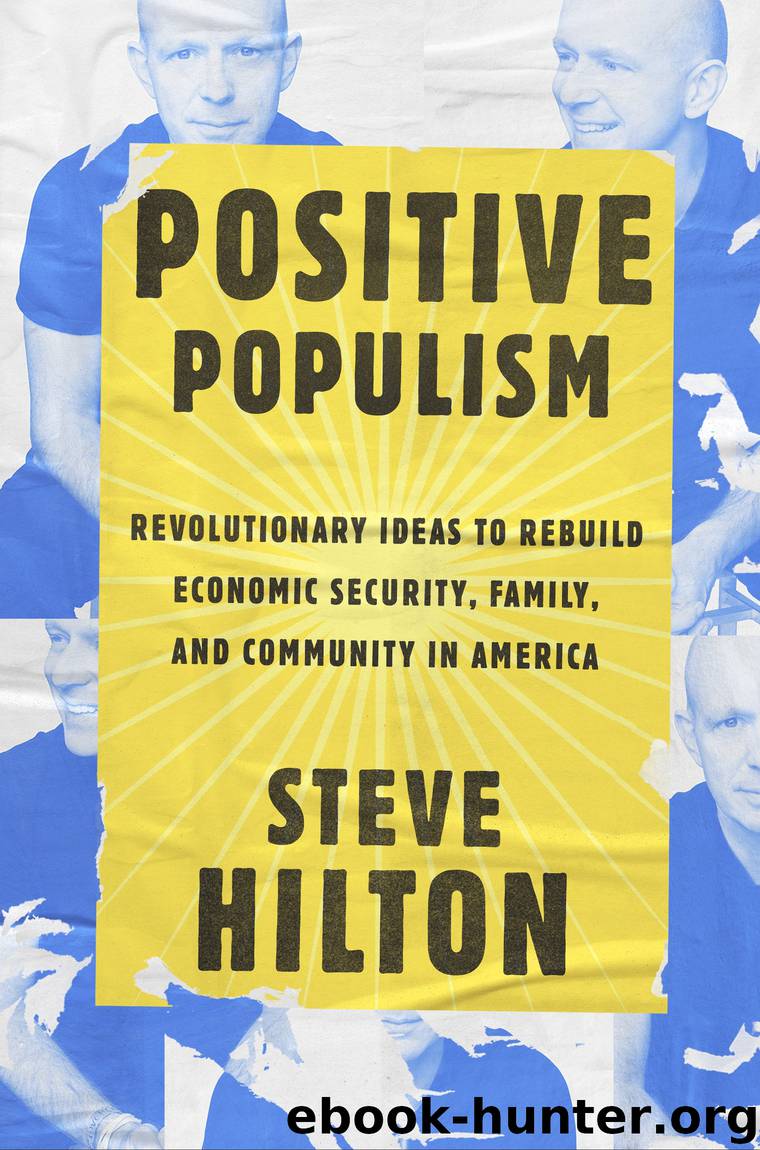Positive Populism by Steve Hilton

Author:Steve Hilton
Language: eng
Format: epub
Publisher: The Crown Publishing Group
Published: 2018-09-03T16:00:00+00:00
2. PARENTING EDUCATION
One of the biggest social divides that has opened up between the elite and working Americans is parenting. The wealthiest and most privileged parents invest more and more time and money in their children’s development and education and, as we have already seen, are more likely to be married and devoted to child-rearing as the central “project” of their lives. As a result, the elite (the top 20 percent, at least) are entrenching their advantages, pulling away from the middle and working classes and contributing to a collapse of social mobility in America. This trend has been brilliantly documented by Richard Reeves of the Brookings Institution in his book Dream Hoarders: How the American Upper Middle Class Is Leaving Everyone Else in the Dust.
What’s the positive populist response? Not to condemn the elites for their commitment to their children’s future success. Good luck to them. The right answer is to help working families give their children the best possible start in life, too. And much of that comes down to parenting. In fact, studies have shown that parenting style is the key factor in determining children’s life chances, more important even than their family’s economic circumstances.
The conventional wisdom about parenting is that it’s one of those instinctive or inherited things that everyone knows how to do, without external advice or help (other than from a well-meaning grandmother). This is, of course, nonsense. Yes, it’s true that parents have been raising children successfully for many thousands of years without help from “experts” or “busybodies” from outside the immediate family. But it’s also true that the world is changing faster than ever, it’s tougher and more competitive, and the skills children now need in order to navigate and succeed in it are increasingly the kind of character skills that are more dependent on what their parents do than on what their teachers do. In any case, you only have to look at the burgeoning market for parenting books and video content to see that parents want all the “expert” advice they can get. But like anything else, a book or a video gets you only so far.
The evidence shows that the best way to help parents acquire the tips and confidence they’re so desperately looking for is through in-person parenting classes in the company of other parents. The most successful examples are eight-to-ten-week courses with one class a week, usually in the evenings, of about two hours. Participants extol the virtues not just of the practical hands-on confidence you get from a class, but the camaraderie with the other parents: the ability to ask questions, bounce ideas off someone, and, most important, relieve the pervasive sense of guilt and inadequacy that so many parents feel by sharing war stories and realizing they are not alone in finding parenting really, really hard. But there’s a stigma attached to parenting education. Aren’t parenting classes supposed to be for failed parents? The ones who’ve had their children taken away from them or
Download
This site does not store any files on its server. We only index and link to content provided by other sites. Please contact the content providers to delete copyright contents if any and email us, we'll remove relevant links or contents immediately.
The Secret History by Donna Tartt(18998)
The Social Justice Warrior Handbook by Lisa De Pasquale(12177)
Thirteen Reasons Why by Jay Asher(8874)
This Is How You Lose Her by Junot Diaz(6856)
Weapons of Math Destruction by Cathy O'Neil(6248)
Zero to One by Peter Thiel(5765)
Beartown by Fredrik Backman(5716)
The Myth of the Strong Leader by Archie Brown(5481)
The Fire Next Time by James Baldwin(5409)
How Democracies Die by Steven Levitsky & Daniel Ziblatt(5200)
Promise Me, Dad by Joe Biden(5130)
Stone's Rules by Roger Stone(5065)
A Higher Loyalty: Truth, Lies, and Leadership by James Comey(4937)
100 Deadly Skills by Clint Emerson(4899)
Rise and Kill First by Ronen Bergman(4758)
Secrecy World by Jake Bernstein(4727)
The David Icke Guide to the Global Conspiracy (and how to end it) by David Icke(4684)
The Farm by Tom Rob Smith(4486)
The Doomsday Machine by Daniel Ellsberg(4473)
